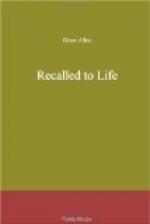The words took my breath away. They were too horrible to realise. I positively couldn’t speak. I went up to the bookstall, laid down my penny without moving my lips, and took the paper in my hand in tremulous silence.
I dared not open it there and then, I confess. I waited till I was in the train, and on my way to Woodbury.
When I did so, it was worse, even worse than my fears. The article was short, but it was very hateful. It said nothing straight out—the writer had evidently the fear of the law of libel before his eyes as he wrote,—but it hinted and insinuated in a detestable undertone the most vile innuendoes. A Treasury Doctor and a Police Inspector, it said, had lately examined Miss Callingham again, and found her intellect in every respect perfectly normal, except that she couldn’t remember the face of her father’s murderer. Now, this was odd, because, you see, Miss Callingham was in the room at the moment the shot was fired; and, alone in the world, Miss Callingham had seen the face of the man who fired it. Who was that man? and why was he there, unknown to the servants, in a room with nobody but Mr. Callingham and his daughter? A correspondent (who preferred to guard his incognito) had suggested in this matter some very searching questions: Could the young man—for it was allowed he was young—have been there with Miss Callingham when Mr. Callingham entered? Could he have been on terms of close intimacy with the heroine of The Grange Mystery, who was a young lady—as all the world knew from her photographs—of great personal attractiveness, and who was also the heiress to a considerable property? Could he have been there, then, by appointment, without the father’s knowledge? Was this the common case of a clandestine assignation? Could the father have returned to the house unexpectedly, at an inopportune moment, and found his daughter there, closeted with a stranger—perhaps with a man who had already, for sufficient grounds, been forbidden the premises? Such things might be, in this world that we live in: he would be a bold man who would deny them categorically. Could an altercation have arisen on the father’s return, and the fatal shot have been fired in the ensuing scuffle? And could the young lady then have feigned this curious relapse into that Second State we had all heard so much about, for no other reason than to avoid giving evidence at a trial for murder against her guilty lover?
These were suggestions that deserved the closest consideration of the Authorities charged with the repression of crime. Was it not high time that the inquest on Mr. Callingham’s body should be formally reopened, and that the young lady, now restored (as we gathered) to her own seven senses, should be closely interrogated by trained legal cross-examiners?




